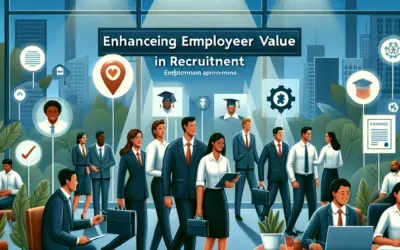The Importance of Academic Excellence in Education Recruitment
When it comes to recruiting educators, the role of academic excellence cannot be overstated. In a landscape where education serves as the bedrock of society’s intellectual and ethical development, the value of qualified and competent educators is paramount. These individuals are not only responsible for imparting knowledge but also for shaping the future generations’ abilities to critically think, adapt, and contribute meaningfully to an ever-changing world.
Setting the Standards for Educational Quality
Academic excellence acts as a benchmark for quality in the realm of education recruitment. Administrators and educational institutions often prioritize candidates with a strong academic background because this reflects a commitment to mastery and a profound understanding of their subject matter. High academic achievers are perceived as being well-equipped to create robust curriculums, introduce innovative teaching methodologies, and command respect in the classroom.
Fostering a Competitive Learning Environment
The presence of academically accomplished educators within school faculties can cultivate a competitive atmosphere that drives students to excel. Teachers with distinct accolades and a history of academic success serve as role models, demonstrating the fruits of dedication and hard work. This is especially crucial during a student’s formative years, where early exposure to excellence can have a lasting impact on their educational journey and overall achievement.
Enhancing Institution Reputation and Student Success
Education institutions have a vested interest in the success of their students, with academic achievements often serving as a reflection of the teachers’ abilities. Educators who have excelled academically tend to be more adept at preparing students for the rigors of higher education and competitive job markets. This, in turn, improves the reputation of the educational institution, attracting more students and potentially leading to better funding and resources.
In conclusion, academic excellence is a cornerstone of education recruitment for good reason. It ensures that those at the forefront of educating the next generation possess the qualifications, knowledge, and dedication required to uphold the highest standards of teaching. As educators mold the minds of future leaders, scientists, and innovators, their academic backgrounds play a critical role in ensuring that students are not just educated, but also inspired to achieve their utmost potential.
Key Strategies for Sourcing Top Talent in the Educational Sector
Understanding the Unique Needs of Educational Institutions
Attracting top talent to the educational sector begins by understanding the distinct requirements of educational institutions. Before casting the recruitment net, it’s imperative to identify the desired competencies, skills, and qualities that the ideal candidate should possess. Aligning with the school’s vision, mission, and educational philosophies is fundamental for any potential hire. Furthermore, acknowledging the significance of soft skills like communication, adaptability, and continuous learning can play a critical role in identifying educators who are not only knowledgeable but also capable of fostering a positive and dynamic learning environment.
Developing a Comprehensive Job Profile
Creating an extensive job profile that encompasses everything from teaching philosophy to technical skills can provide clarity for both the employer and the prospective candidates. This profile should serve as a benchmark for all stages of the hiring process to ensure that only the most suitable candidates are considered. Additionally, a detailed job profile allows potential applicants to fully understand what is expected of them, thereby attracting those who truly align with the institution’s goals.
Promoting Opportunities Through Targeted Platforms
Finding the right candidates involves strategic promotion of job openings through platforms where such talent is likely to engage. Traditional job boards might not always reach the niche audience you’re targeting. Instead, focusing on education-specific job portals, professional networks, and social media groups can lead to more effective results. Moreover, leveraging alumni networks and educational associations can help tap into a rich vein of experienced professionals looking for new opportunities within the educational sector.
Utilizing Technology in Recruitment
The effective use of technology, including Applicant Tracking Systems (ATS) and recruitment software, can streamline the hiring process and ensure a wider reach. These tools can help educational institutions manage large volumes of applications and maintain communication with candidates, which enhances the candidate experience. Through technology, even the initial screening phase can become more efficient, allowing hiring managers to quickly identify the most promising applicants.
Building a Strong Employer Brand
Establishing a strong employer brand is central to attracting and retaining top talent in education. This involves communicating the values, successes, and unique attributes of the institution to create a compelling narrative that resonates with job seekers. Prospective employees are often looking for organizations that prioritize professional development, work-life balance, and a supportive community. An attractive employer brand that emphasizes these qualities can make a substantial difference in appealing to high-quality candidates.
Engaging Current Staff as Brand Ambassadors
The most credible promoters of your institution’s brand are often your current staff members. By empowering them to share their positive experiences and stories, they effectively become brand ambassadors to the educational community. Encouraging staff to participate in career fairs, industry conferences, and networking events can extend your institution’s reach and help forge connections with potential applicants. An authentic, employee-driven representation of an institution’s culture can have a profound impact on recruitment success.
Investing in Professional Development and Growth
Top talent is typically drawn to roles that offer opportunities for professional development and career progression. Educational organizations must demonstrate a commitment to investing in the growth of their faculty and staff. This can include providing access to further education, training sessions, workshops, and mentoring programs. Showcasing a clear and structured career pathway can be a powerful enticement for ambitious educators seeking to advance their careers within a supportive and progressive environment.
Fostering a Culture of Learning and Innovation
To retain high-caliber teaching professionals, schools must foster a culture that is conducive to learning and innovation. This entails not only supporting ongoing education but also encouraging teachers to develop new teaching methods and curricula. Recognizing and rewarding creativity and leadership in educational practice can motivate educators to continue pushing the boundaries of their profession, benefiting not only themselves but also their students and the institution as a whole.
How to Evaluate Potential Hires for Academic Excellence
Evaluating Academic Excellence in Potential Hires
Understanding the Indicators of Academic Success
When evaluating potential hires, it’s crucial to consider their academic achievements as a testament to their dedication and knowledge. However, grades alone don’t provide a complete picture. Look for candidates with a history of engaging in challenging coursework, maintaining a high GPA while balancing extracurricular activities, or participating in academic competitions. Such indicators reflect an individual’s drive and ability to excel under pressure.
Reviewing Academic Transcripts
An academic transcript is more than a scorecard; it reflects a candidate’s consistency and areas of expertise. Scrutinize not just the grades but the rigor of the subjects. Continuous improvement and advanced classes point to a candidate’s growth mindset.
Recognizing Extracurricular Involvement
Engagement in clubs, sports, or academic societies can highlight a candidate’s teamwork and leadership skills. Look for roles that required responsibility, such as being a club officer or organizing events, as these experiences often foster skills that are transferable to the workplace.
Assessing Critical Thinking and Problem-Solving Abilities
Academic excellence isn’t solely about what one has learned, but also how they apply this knowledge. During interviews, present candidates with real-world problems related to your industry. Their approach to solving these problems can reveal their critical thinking skills and ability to apply academic principles to practical scenarios.
Conducting Case Study Interviews
Case study interviews are an effective way of measuring a potential hire’s problem-solving capabilities. Offer a scenario that your company has faced and ask the candidate for their analysis and solution. Not only does this show their thought process, but it also demonstrates their potential fit within your company’s culture and workflows.
Incorporating Academic Achievements into the Bigger Picture
While academic excellence is a valuable metric, it’s essential to consider the candidate’s overall portfolio. Their soft skills, work experience, and cultural fit play equally important roles in their potential success at your company. Integrate their academic accomplishments into a broader assessment that includes a range of competencies and characteristics valuable to your team.
Evaluating Soft Skills
Soft skills such as communication, adaptability, and emotional intelligence are critical in today’s workforce. Observe how candidates interact with staff during their interviews and consider conducting group interviews to see how they collaborate and communicate with others.
Building a Team of Educators Committed to Academic Success
Fostering a Culture of Collaboration
Creating a learning environment that facilitates student achievement begins with building a team of educators united by a common vision. Collaboration among teachers not only enhances peer-to-peer support but also enables the sharing of diverse teaching strategies and techniques. To foster cohesion, regular team meetings and professional development workshops can be pivotal. In these spaces, educators can freely exchange ideas, discuss curriculum challenges, and seek constructive feedback—all vital for promoting continual improvement and a unified approach to teaching.
Recruitment and Professional Growth
The bedrock of an effective team of educators lies in their recruitment. Seeking individuals who show both expertise in their subject matter and a genuine passion for teaching is essential. The hiring process should not solely focus on academic qualifications but also take into account an applicant’s compatibility with the institution’s educational ethos and values. Coupled with recruitment is the importance of ongoing professional development. Investing in your team’s growth through educational conferences, workshops, and courses ensures that they stay current with the latest educational research and technologies, thereby enhancing their proficiency and satisfaction.
Supporting Educator Well-being
It is paramount to acknowledge that the well-being of teachers significantly affects their ability to foster academic success. A school environment that supports its educators’ mental, emotional, and physical health can lead to increased productivity and reduced burnout. This, in turn, positively affects student performance. Initiatives such as peer support groups, access to counseling services, and work-life balance policies can make educators feel valued and supported, driving them to commit fully to their students’ academic journeys.
Encouraging Student-Centered Learning
Lastly, the most dedicated teams of educators always place students at the heart of the learning process. Tailoring education to cater to diverse learning styles and students’ individual needs ensures that each student can thrive. Educators should be encouraged to employ various instructional strategies, from interactive problem-solving to tech-assisted teaching tools, aiming to engage and challenge students effectively. In such an environment, students feel seen, heard, and inspired to pursue academic excellence with the unwavering support of their teachers.
The Role of Technology in Streamlining Hiring in Education
In the dynamic world of education, acquiring the right talent has become more imperative than ever. Technology has revolutionized this process, making hiring more efficient, effective, and equitable. From attracting candidates to onboarding new hires, technology plays a pivotal role in modern recruiting strategies in the education sector. Let’s explore how technological advancements are transforming the hiring landscape for educators and administrative staff.
Automating Recruitment with Applicant Tracking Systems (ATS)
Applicant tracking systems (ATS) are at the forefront of hiring optimization. By automating the collection, organization, and analysis of candidate information, ATS platforms significantly reduce the administrative burden on recruitment teams. With features like resume parsing, keyword matching, and communication management, these systems help in quickly identifying top talent. The integration of machine learning algorithms further refines the process, enabling the prediction of candidate suitability and ensuring a good fit for the institution.
Leveraging Social Media and Job Portals for Broader Reach
Education institutions are increasingly turning to social media and specialized job portals to cast a wider net and reach more potential candidates. Platforms such as LinkedIn, Indeed, and niche education job boards enable recruiters to advertise vacancies to a targeted audience. Easy access to reviews, company culture, and expectations has also made it possible for candidates to gauge fit before applying, leading to more interest from qualified individuals. Additionally, these online avenues provide an opportunity for schools to showcase their values and attract like-minded educators, fostering a community of passionate professionals.
Enhancing Candidate Experience with Mobile-Friendly Solutions
The modern job seeker uses mobile devices extensively in their job search. Recognizing this trend, progressive educational institutions have adopted mobile-friendly application processes. With simplified forms, responsive design, and instant notifications, candidates can apply for positions on-the-go without friction. This not only improves the candidate experience but also speeds up the hiring cycle, as mobile optimization allows for continuous communication and engagement with potential hires. Furthermore, with the integration of video interview tools, candidates can participate in the selection process from anywhere in the world.
Supporting Data-Driven Decisions with Analytics
Data analytics tools have become invaluable in hiring. They allow educational institutions to make informed decisions based on empirical evidence rather than intuition alone. By analyzing recruitment data, schools can identify trends, measure the effectiveness of different hiring channels, and refine their strategies accordingly. This data-driven approach helps in optimizing resource allocation, reducing time-to-hire, and ultimately enhancing the quality of hires. In essence, technology ensures that the hiring process is not only faster but smarter.
In conclusion, the education sector is reaping the benefits of technology in hiring – from initial outreach to the final decision. By embracing technological tools, schools can streamline their recruitment process, thereby securing top talent that will drive educational success. As technology continues to advance, so too will the sophistication and efficiency of hiring strategies in education, ensuring that institutions remain adaptive and competitive in an ever-evolving landscape.













0 comentarios